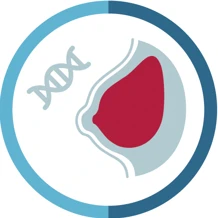What is hereditary breast cancer?
Hereditary Breast Cancer
A small percentage of people with breast cancer—about 5-10%—developed breast cancer as a result of a hereditary predisposition. A hereditary predisposition means that a single change to the DNA significantly increases the risk of developing breast cancer.
Signs of a possible hereditary predisposition for breast cancer include being diagnosed at a notably young age, hormone-resistant breast cancer, the presence of the Her2Neu protein (‘triple negative’), or ovarian cancer in the family. People of Jewish descent who develop breast cancer may also be a reason for genetic testing.
Familial Predisposition
In some families, multiple women have been diagnosed with breast cancer, but no hereditary predisposition has been detected through DNA testing. If this is the case, we speak of familial breast cancer.
If you suspect that you have a hereditary predisposition for cancer, you and your family members can receive advice from the Clinical Genetics Department at the Netherlands Cancer Institute. Based on the results, we can offer personalized advice on periodic screenings and preventive measures.
Other Causes of Breast Cancer
The causes of breast cancer are often not clear. However, breast cancer is more common in women who:
- Had their first menstruation at a young age and experienced menopause at a late age;
- Do not have children or had their first pregnancy after the age of 35;
- Have used hormone-heavy birth control pills at a young age for a long period, or have taken hormone therapies for menopause symptoms for an extended time;
- Have a less healthy lifestyle, including physical inactivity, excessive alcohol consumption, smoking, or being overweight.
A small percentage of people with breast cancer—about 5-10%—developed breast cancer as a result of a hereditary predisposition. A hereditary predisposition means that a single change to the DNA significantly increases the risk of developing breast cancer.
If there are indications of a possible hereditary predisposition for breast cancer, you can be referred for a genetic investigation at the Clinical Genetics outpatient clinic at the Netherlands Cancer Institute. If you have not been diagnosed with breast cancer yourself, it is preferred that a family member with breast cancer be referred for the genetic investigation.
A clinical geneticist can assess your risk of developing (or redeveloping) breast cancer based on family history and a possible DNA test and provide recommendations for breast screenings.
Specialists at the NKI Center for Early Diagnostics can refer you for an appointment with the Clinical Genetics clinic. Your general practitioner or specialist can also refer you to this clinic. The costs of genetic testing are covered by the Dutch basic health insurance package, but keep in mind that your deductible (own risk) may apply.

